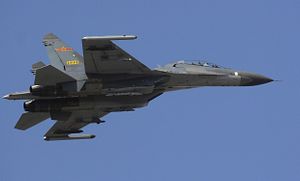As the world cheered the news that the P5+1 and Iran had finally concluded an agreement over Tehran’s nuclear program, East Asia moved one step closer to a full-blown crisis. And to be frank, the world has much more to worry about in East Asia than the never ending crisis that is the Middle East — like the world’s second and third largest economies clashing.
In what can only be called choice timing on Beijing’s part, its declaration of an “East China Sea Air Defense Identification Zone (ADIZ)” has essentially crafted another step towards growing claims of sovereignty over the area around the Senkaku/Diaoyu Islands. Nothing screams sovereignty like telling the world that the airplanes in the skies above the territory you claim must file flight plans with China. Considering Beijing’s past moves of non-naval maritime assets patrolling the area around the Senkakus to the more recent air patrols, the trend lines here are becoming increasingly dangerous and provocative.
Speaking of timing, while there are certain advantages to trying to essentially game the news cycle by making such an announcement while the world is focused on Iran, in many respects, the timing could not be any worse for China. Indeed, the new ADIZ came on the heels of China catching flack for providing little aid to the Philippines in its hour of need until global headlines compelled it to change direction — albeit only slightly. For those who care deeply about these issues, it appears Beijing does not care about the impressions it makes throughout the region. For whatever reason it feels compelled to act boldly, and act it has.
What to make of such a move? From where I sit here in Washington, three observations seem very clear.
First, the United States and its allies need to show in words as well as in deeds that such a zone will not be tolerated. Just because China has made such a declaration, it does not have to be respected. And no, I don’t mean this in the most hawkish sense of the word like placing aircraft carriers out near the Senkakus or some other outwardly aggressive act. But I would not change the current dynamics in the region just because China feels it can slowly alter the status quo. The United States and Japan must show that declarations will not change facts in the air. America’s B-52 flight this week is a good indicator that Washington is following such a policy and should stand firm and do what it can to negate what can only be called a game of geo-strategic chicken on China’s part.
At the same time, Washington must show the same zeal in working with its Asian allies as it does when dealing with the Middle East. Now that the U.S. has concluded an agreement with Iran, Washington must turn its attention to what could very well turn out to be the beginnings of a much deeper diplomatic and military crisis. Secretary Kerry should have been on the next flight to Japan or at the very least working the phones feverishly to decrease tensions and reassure important allies. Unfortunately, President Obama’s planned trip to Asia in April, while certainly a good thing, could now be too little too late.
Finally, speaking of President Obama, presidential leadership is needed on important issues in Asia that seem to have lingered since the departure of Kurt Campbell and Hillary Clinton. From tensions in the South China Sea and China’s growing military might, to America’s relationship with India, to wider topics such as trade — these issues must be front in center in the president’s mind and part of his daily agenda with the media when discussing matters of foreign policy. This would help with a much wider goal: the need for America to re-energize the “pivot” or “rebalance” to Asia, moving it from a great bumper sticker line to an actual foreign policy strategy that has some teeth and diplomatic muscle to match.
While events in Syria and Iran have drawn away the administration’s focus and rightly so, brewing tensions in Asia and their possible global ramifications clearly demonstrate that American leadership is needed. Leading from behind at a time when tensions are only mounting would be a tragic mistake.

































